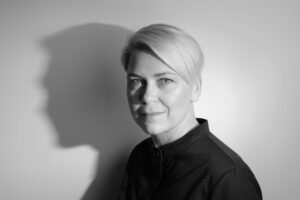Laima Kreivytė

Photo by Tomas Petrulis
The poet and art critic Laima Kreivytė (b. 1972) is an exceptional personality in the Lithuanian poetry scene. First of all, Kreivytė is not a philologist, unlike many Lithuanian poets: in 1995, she graduated from Vilnius Academy of Arts where she is currently teaching and curating art exhibitions. Although Kreivytė has been well known as a poet since the ’90s (her first publication appeared in the cultural press in 1996), her debut was a rather late one – her poetry book Sapfo skai(s)tykla (Sappho’s Purgatorial Library; the original title contains a play on the words skaitykla – reading room, and skaistykla – purgatory) was published in 2013. Kreivytė is a regular participant and organiser of literary festivals and readings. She believes that poetry can be both personal and intimate, social and critical. Kreivytė’s poems have been translated into English, Chinese and other languages.
The title Sapfo skai(s)tyklos features the most important principles of Kreivytė’s poetry. First of all, the Sappho theme – LGBTQ motifs are particularly significant in the poems, although they don’t turn into declarations or direct confessions because of their postmodern playfulness. The poet manages to effortlessly reveal the constantly changing sensual registers, the dramatic nature of existence and everyday life by employing associations and word plays, ironic cultural allusions and intertextual references. For example, the title of the first book suggests that one additional letter is enough for a reading room to be turned into purgatory. The poet’s second collection, Artumo aritmetika (Intimate Arithmetic, 2019), combines the registers of confessional lyric and Sappho with the attitude of a socially engaged feminist. On the other hand, both the lyricism and the cultural criticism remain playful in an idiosyncratic, Kreivytė-esque way.